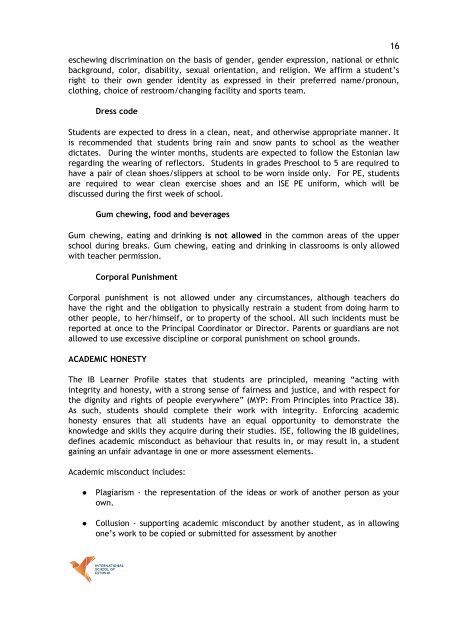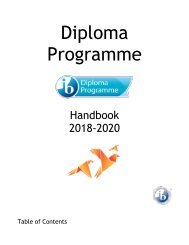Student-Parent Handbook 2019-20.docx
You also want an ePaper? Increase the reach of your titles
YUMPU automatically turns print PDFs into web optimized ePapers that Google loves.
eschewing discrimination on the basis of gender, gender expression, national or ethnic<br />
background, color, disability, sexual orientation, and religion. We affirm a student’s<br />
right to their own gender identity as expressed in their preferred name/pronoun,<br />
clothing, choice of restroom/changing facility and sports team.<br />
Dress code<br />
<strong>Student</strong>s are expected to dress in a clean, neat, and otherwise appropriate manner. It<br />
is recommended that students bring rain and snow pants to school as the weather<br />
dictates. During the winter months, students are expected to follow the Estonian law<br />
regarding the wearing of reflectors. <strong>Student</strong>s in grades Preschool to 5 are required to<br />
have a pair of clean shoes/slippers at school to be worn inside only. For PE, students<br />
are required to wear clean exercise shoes and an ISE PE uniform, which will be<br />
discussed during the first week of school.<br />
Gum chewing, food and beverages<br />
Gum chewing, eating and drinking is not allowed in the common areas of the upper<br />
school during breaks. Gum chewing, eating and drinking in classrooms is only allowed<br />
with teacher permission.<br />
Corporal Punishment<br />
Corporal punishment is not allowed under any circumstances, although teachers do<br />
have the right and the obligation to physically restrain a student from doing harm to<br />
other people, to her/himself, or to property of the school. All such incidents must be<br />
reported at once to the Principal Coordinator or Director. <strong>Parent</strong>s or guardians are not<br />
allowed to use excessive discipline or corporal punishment on school grounds.<br />
ACADEMIC HONESTY<br />
The IB Learner Profile states that students are principled, meaning “acting with<br />
integrity and honesty, with a strong sense of fairness and justice, and with respect for<br />
the dignity and rights of people everywhere” (MYP: From Principles into Practice 38).<br />
As such, students should complete their work with integrity. Enforcing academic<br />
honesty ensures that all students have an equal opportunity to demonstrate the<br />
knowledge and skills they acquire during their studies. ISE, following the IB guidelines,<br />
defines academic misconduct as behaviour that results in, or may result in, a student<br />
gaining an unfair advantage in one or more assessment elements.<br />
Academic misconduct includes:<br />
16<br />
●<br />
●<br />
Plagiarism - the representation of the ideas or work of another person as your<br />
own.<br />
Collusion - supporting academic misconduct by another student, as in allowing<br />
one’s work to be copied or submitted for assessment by another




